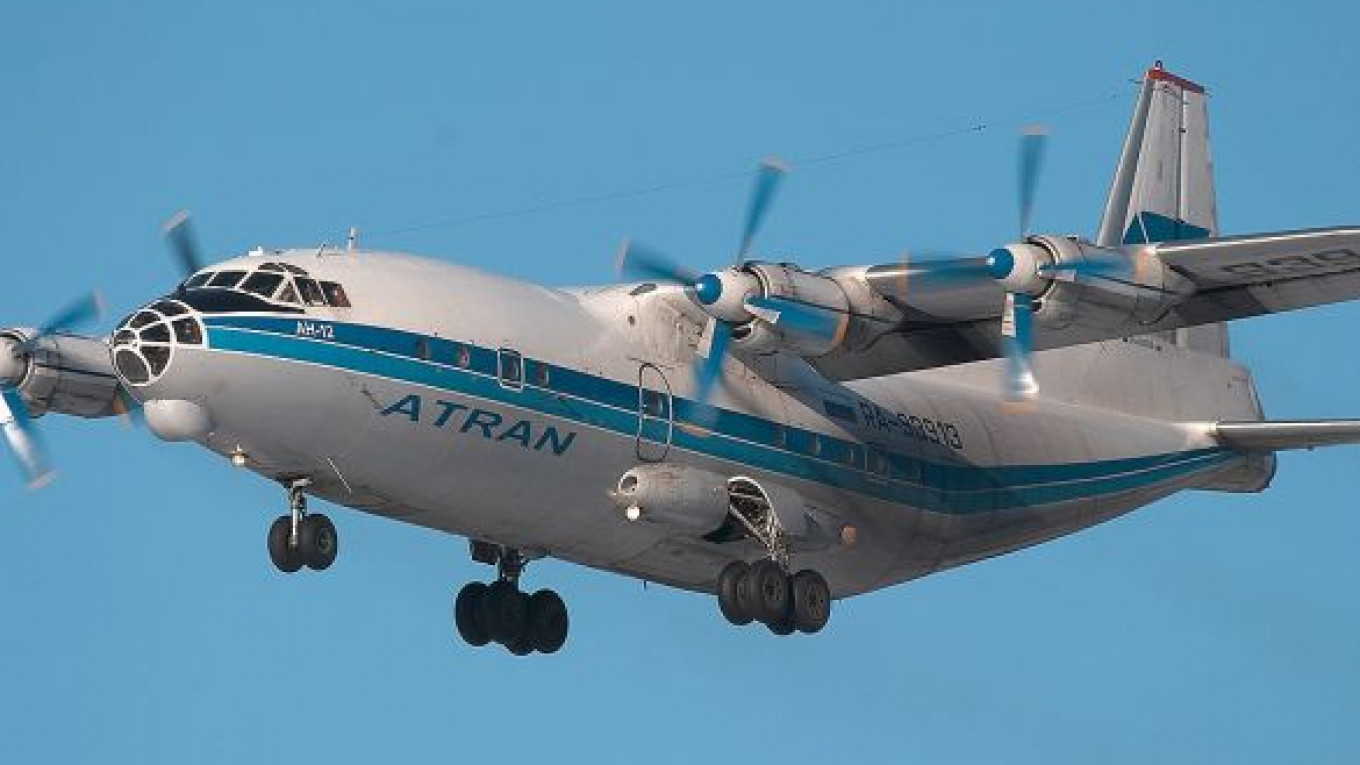The oldest An-12 cargo plane in Russia's civilian fleet went missing over the Magadan region with 11 people on board Tuesday, shortly after the pilot reported an engine fire and attempted an emergency landing on a hillside cloaked in thick fog.
Local prosecutors initially said the plane had crashed and no one survived but later backtracked to say the plane had not been found. A search operation over vast swathes of the northern taiga where the An-12 was last registered on radar screens produced no results late Tuesday.
This is the second incident with a commercial plane in two days and the fourth this summer. Government officials were quick to propose a crackdown on small air carriers Tuesday, disregarding the fact that they provide the only connection to the outside world for many remote settlements.
The An-12 was flying from the city of Magadan to the Chukotka village of Kepermeyem with a crew of nine, two passengers and 16 tons of food, the Far Eastern Transportation Prosecutor's Office said.
The pilot reported to ground control that one of the plane's four turboprops was on fire, the prosecutors said in a statement on their web site. The local branch of the Investigative Committee the fire was preceded by a fuel leak.
The plane was some 300 kilometers away from Magadan at the time, the Emergency Situations Ministry said, Interfax reported.
More than 110 rescuers, some of them volunteers, and 19 vehicles, including off-road vehicles and airplanes, were deployed for the search operation, the ministry said.
Though the fate of the crew and passengers remained unclear, local investigators opened a case on the premise that the plane had crashed because of air safety rule violations and some or all the people on board were dead.
The missing An-12 was operated by Khabarovsk-based Avis-Amur airline on lease from the Knaapo company, whose headquarters are in Komsomolsk-on-Amur, prosecutors .
The plane was built in 1963 at a Tashkent plant that commissioned a total of 830 aircraft before production ended in 1972, according to Russianplanes.net, an unofficial air industry database run by aviation experts. In total, more than 1,200 of these planes were produced in the Soviet Union.
The turboprop, one of about 30 An-12s still in operation nationwide, was 19 months from the end of its life span of 50 years and was "the oldest An-12 used in Russia's civil aviation," Russianplanes.net .
But the plane's age did not necessarily contribute to Tuesday's troubles, because maintenance outweighs the manufacturing date, said veteran pilot Oleg Smirnov, who used to be deputy head of the Soviet Civil Aviation Ministry.
"The aircraft's service lifetime hadn't expired, but its safety depended on those who were maintaining it," Smirnov said by telephone.
Investigators did not comment Tuesday on the plane's technical condition. Local transportation prosecutors said they had opened a check into Avis-Amur.
On Monday, an An-24 twin turboprop crash-landed at the airport in the far eastern city of Blagoveshchensk, injuring 12. A preliminary inquiry blamed the incident on poor weather.
Another An-24 crash-landed on the Ob River last month after an engine caught fire, killing seven of the 37 people on board. A June crash of a Tu-134 jet in foggy conditions in Karelia's capital, Petrozavodsk, killed 47 of the 52 people on board.
President Dmitry Medvedev has ordered that An-24s and Tu-134s be phased out "as soon as possible" following the incidents. He did not say Tuesday whether the ban should be extended to An-12s.
United Arab Emirates, where five An-12s were in operation, grounded them last year after a runway incident. But the consequences of a similar ban in Russia would be more serious, because the planes are ideally suited to operate on unpaved runways in far-flung regions of Siberia and the Far East.
Millions of people would be cut off from the rest of Russia if the ban on Tu-134 and An-24 aircraft comes into force, local airlines complained last month.
Adding to the problems of small carriers, Deputy Prime Minister Sergei Ivanov proposed Tuesday that airlines whose fleets number less than 20 airplanes should be closed. There are about 120 such companies in the country, he said.
Ivanov described the small carriers as "zhyvopyrky," an eyebrow-raiser of a Russian word denoting a noisy and constantly crowded place, and said they should be purged from the market because they cannot afford to replace their old planes, Interfax reported. He said the ban should not cover charter airlines.
"The idea is reasonable, but the government should be careful about its implementation," Smirnov said, pointing out that small companies operate in many small localities that are unable to attract big carriers.
A Message from The Moscow Times:
Dear readers,
We are facing unprecedented challenges. Russia's Prosecutor General's Office has designated The Moscow Times as an "undesirable" organization, criminalizing our work and putting our staff at risk of prosecution. This follows our earlier unjust labeling as a "foreign agent."
These actions are direct attempts to silence independent journalism in Russia. The authorities claim our work "discredits the decisions of the Russian leadership." We see things differently: we strive to provide accurate, unbiased reporting on Russia.
We, the journalists of The Moscow Times, refuse to be silenced. But to continue our work, we need your help.
Your support, no matter how small, makes a world of difference. If you can, please support us monthly starting from just $2. It's quick to set up, and every contribution makes a significant impact.
By supporting The Moscow Times, you're defending open, independent journalism in the face of repression. Thank you for standing with us.
Remind me later.






